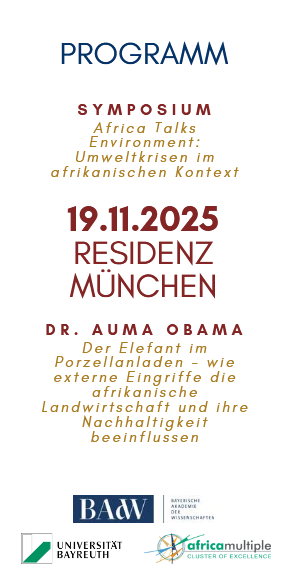Important Dates
Conference (Cluster/BAdW): Africa Talks Environment: Umweltkrisen im afrikanischen Kontext
19.11.2025
München/Munich, Bayerische Akademie der Wissenschaften
Africa Talks Environment is a one-day interdisciplinary conference exploring the ecological and social dimensions of environmental crises, with a particular focus on the African continent. Africa is among the regions most severely affected by climate change, pollution, and environmental degradation. Yet, it is also home to innovative environmental practices, diverse knowledge systems, and pioneering research that provide vital insights for global debates on sustainability. Scholars from Burkina Faso, Zimbabwe, Tanzania, South Africa, France, the Netherlands, and Germany will come together to exchange perspectives across disciplines.
The program is jointly organized by the Bavarian Academy of Sciences and Humanities (BAdW) and the Cluster of Excellence Africa Multiple.
PLEASE NOTE THAT YOU NEED TO REGISTER FOR THE DAY AND THE EVENING EVENTS INDIVIDUALLY!
- Please register for the day event here: REGISTRATION
- Please register for the evening event here: REGISTRATION
- Find the flyer here
AFRICA TALKS ENVIRONMENT: UMWELTKRISEN IM AFRIKANISCHEN KONTEXT
Symposium and Evening Event
– Programme –
19. November 2025
09:30–10:10 Registration & coffee at the Bavarian Academy of Sciences and Humanities
Alfons-Goppel-Str. 11 | Residenz | 80539 München
10:15–10:30 Welcome
Markus Schwaiger, President of the Bavarian Academy of Sciences and Humanities
Rüdiger Seesemann, Dean, Africa Multiple Cluster of Excellence, University of Bayreuth
10:30–10:45 Opening Remarks
Lisa Hülsmann, Ecosystem Analysis and Simulation, and Eric Anchimbe, English Linguistics, both University of Bayreuth
10:45–12:30 Roundtable: Resources and environmental justice (chair: Eveline Sawadogo-Compaoré, UJKZ, Ouagadougou)
Africa has long been described as a continent rich in “natural resources”, facilitating a variety of oversea extractive projects and their material infrastructures in different periods, including most recently those connected to the green energy transition. This roundtable explores current developments with a view to social and environmental justice.
- Lesley J F Green, Environmental Humanities South, University of Cape Town, South Africa
- Valerie Hänsch, Social Anthropology, Institute of Social and Cultural Anthropology, Ludwig-Maximilians-University, Munich, Germany
- Shadrach Kerwillain, Conservation biologist, Rachel Carson Center for Environment and Society, Ludwig-Maximilians-University, Munich, Germany
- Nelson Odume, Water Resource Science, Institute for Water Research, Rhodes University, Makhanda, South Africa
- Cyrus Samimi, Climatology, Research Group of Climatology, University of Bayreuth, Germany
12:30–13:30 Lunch
13:30–15:15 Roundtable: Agriculture and innovation (chair: Ben Kirby, Study of Religion with focus on global entanglements, UBT)
Erratic rainfalls, drought, heat, other climate events, and biological threats are posing increasing risks to agricultural production across the globe. This round table seeks to debate the concurrent adaptations, innovations, and challenges on the African continent.
- Sandra Calkins, Social and Cultural Anthropology with a Focus on Africa, University of Bayreuth, Germany
- Moses Chundu, Economist, Africa Leadership and Management Academy; University of Zimbabwe, and Africa, Network of Centres of Excellence for Disaster Risk Reduction, Harare, Zimbabwe
- Nathalie Jas, French National Institute for Agriculture, Food, and Environment, Montpellier
- Eveline Sawadogo-Compaoré, Centre National de la Recherche Scientifique et Technologique (CNRST) of Burkina Faso at the Institut de l'Environnement et de Recherches Agricoles (INERA), Université KiZerbo, Ouagadougou, Burkina Faso
- Jimmy Tindamanyire, National Agricultural Research Laboratories, University of Kabale, Uganda
15:15–15:45 Coffee break
15:45–17:30 Roundtable: Biodiversity loss and restoration (chair: Lisa Hülsmann, UBT)
Industrial agriculture, deforestation, climate change, pollution and the introduction of alien species have led to a decline of biodiversity across the globe. This roundtable zooms in on current debates, issues of concern and contestations around the proposed paths to restoration on the African continent.
- Bram Büscher, Sociology of Development and Change, Wageningen University, Netherlands
- Steve Higgins, Plant Ecology, University of Bayreuth, Germany
- Camille Jahel, Agronomy, Biogeography, Geography, CIRAD (La recherche agronomique pour le dévelopment), Montpellier, France
- Charles Kilawe, Department of Ecosystems and Conservation at Sokoine University of Agriculture, Tanzania
- Maano Ramutsindela, Department of Environmental & Geographical Science, University of Cape Town, South Africa
The admission to the workshop is free, however due to organizational issues and restricted space we kindly ask to register before 10 November 2025.
Please register for the day event here: REGISTRATION

EVENING EVENT
Please register for the evening event here: REGISTRATION
6:30–7:30 p.m. Public Lecture by Dr. Auma Obama (in German):
„Der Elefant im Porzellanladen – wie externe Eingriffe die afrikanische Landwirtschaft und ihre Nachhaltigkeit beeinflussen" (Like an elephant in a china shop – The influence of external interventions in African agriculture and their impact on its sustainability)
Programme:
- Welcome: Prof. Dr. Markus Schwaiger, President, BAdW
- Introduction of Speaker: Prof. Dr. Stefan Leible, President, University of Bayreuth
- Lecture: Dr. Auma Obama, Kenya: „Der Elefant im Porzellanladen – wie externe Eingriffe die afrikanische Landwirtschaft und ihre Nachhaltigkeit beeinflussen" (Like an elephant in a china shop – The influence of external interventions in African agriculture and their impact on its sustainability)
In ihrem Vortrag „Der Elefant im Porzellanladen – wie externe Eingriffe die afrikanische Landwirtschaft und ihre Nachhaltigkeit beeinflussen“ beleuchtet Dr. Obama die komplexen Auswirkungen internationaler Akteure auf lokale landwirtschaftliche Strukturen in Afrika. Sie zeigt auf, wie globale wirtschaftliche und politische Interessen ökologische Gleichgewichte und nachhaltige Entwicklung auf dem Kontinent beeinflussen – und welche Perspektiven afrikanische Gemeinschaften selbst auf eine zukunftsfähige Landwirtschaft haben.
Der Vortrag regt zum Nachdenken über Verantwortung, Eigenständigkeit und nachhaltige Kooperation im globalen Kontext an und bietet die Möglichkeit, mit Dr. Obama und weiteren Teilnehmenden ins Gespräch zu kommen.


